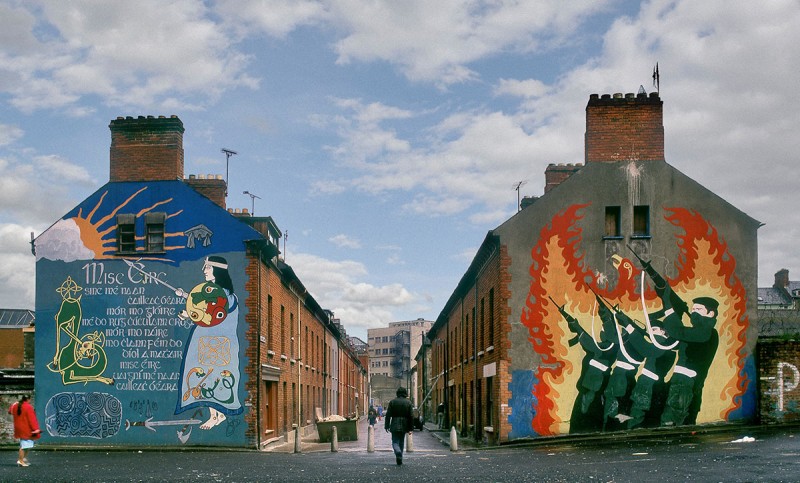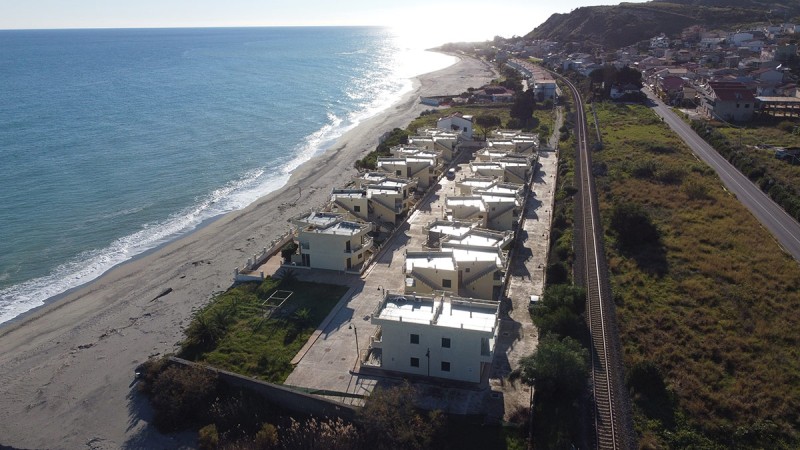Antonio Velardo was on edge.
The suspected money launderer had heard Switzerland had moved to dilute its famous banking secrecy laws, so that foreign authorities would be able to track down bank accounts linked to tax evasion.
“Look, I need all the information on Switzerland,” Velardo demanded of an associate in March 2009. “I really don't like this fact. … These shits [the Swiss] have sold themselves. Switzerland will become a shitty country. … Assholes.”
Velardo, who had turned to Switzerland to stash the equivalent of several million dollars, had reason to be worried. As part of an Italian police probe code-named Operation Metropolis that had started the previous year, he was being pursued by investigators who believed he was cleaning money for the ’Ndrangheta, one of the world’s biggest criminal groups.
In the end, however, Switzerland’s overhaul of its banking regime wasn’t as extensive as Velardo had feared, and his financial secrets remained just that. Until now.
Drawing on bank account data leaked from Swiss banking giant Credit Suisse, as well as Italian legal sources and other insiders, reporters discovered additional details about Velardo and his Italian real estate venture with his partner, convicted Irish Republican Army bomber Henry “Harry” Fitzsimons. Investors lost millions on the real estate project, but it has never been clear where much of the money went.
The Suisse Secrets Investigation
Suisse Secrets is a collaborative journalism project based on leaked bank account data from Swiss banking giant Credit Suisse.
Some of Velardo’s own money can be traced to Credit Suisse, where he held secret accounts. Some of them have remained beyond the reach of Italian authorities, even after police seized the seaside apartment complex in which Velardo and Fitzsimons were major players after suspecting it was used to launder ’Ndrangheta drug money.
“Swiss banks are key for the ’Ndrangheta,” said one of Reggio Calabria's top antimafia prosecutors. “Clans can bring money in safes there, and we would never know. It has taken place since the 1980s, with the spalloni [bagmen] of the ’Ndrangheta walking up to Switzerland with cash.
“Now it happens in more sophisticated ways, with transactions made by financial holdings from around the world. But the concept stays the same.”
Acquitted of money laundering and aiding the mafia in 2016, Velardo has reinvented himself as a real estate investor and would-be Bitcoin expert in Latin America and the Caribbean, boasting that he has a “master’s degree in digital currency.”
The victims of the saga — who lost millions, according to a lawyer representing them — say Velardo and Fitzsimons have a lot to answer for.
Simon Chambers has represented dozens of the case’s victims. After years of litigation, his clients received up to half their money back via an insurance claim. But had the extent of Velardo’s Credit Suisse accounts been known, Chambers said, the case might have been different.
“If that resource was available to them as a source of potential damages, [my clients] would be disgusted today to learn that Velardo has lined his pockets,” Chambers said.
“We knew the money had gone somewhere — it had to go somewhere.”
Asked to comment on the findings of the Suisse Secrets investigation, Credit Suisse said it could not discuss individual customers or accounts. The bank said it “has stringent control mechanisms in place to combat financial crime-related activities. These controls are designed to prevent the exposure of Credit Suisse and its clients to the risks of specific and systematic money laundering.” It added that its client screening is in line with industry standards.
When Harry Met Antonio
The 44-year-old Naples-born Antonio Velardo describes himself on his LinkedIn profile as a “venture capitalist.”
Convicted of petty crime as a young man, he lived in the U.S. and U.K. before relocating to Cape Verde, the Atlantic archipelago off the coast of Senegal, where the ’Ndrangheta is believed by Italian investigators to have a presence.
That’s where, in the mid-2000s, he started working with Fitzsimons, an enigmatic former senior IRA officer who served a decade in prison for a 1971 bombing. Once free, he told reporters he had quit the IRA but still backed its political cause. Then, seemingly overnight, he became a heavyweight property developer in Belfast.
In Cape Verde, Fitzsimons took Velardo under his wing, paying him 4,000 British pounds per week to help him with his real estate business.
Soon, the pair began buying up property in tourist resorts around Europe. According to Italian investigators, they didn’t seem to care “about the price of such assets, as if they had an unlimited amount of money.”
In 2006, the pair opened an Irish company VFI Overseas Properties Real Estate Agent Ltd., to launch real estate projects around the ’Ndrangheta heartland of Calabria, on the toe of Italy’s boot. The Calabrian town of Africo wasn’t an obvious tourist destination, given its oppressive levels of organized crime. Nonetheless, by March 2007 Velardo and Fitzsimons were involved in a major project on ’Ndrangheta turf.
”It was as if they had an unlimited amount of money.”
Italian investigator
In March 2007, their company signed a deal with Antonio Cuppari, who was constructing a huge apartment complex in the seaside town of Brancaleone. Under the deal, VFI would sell apartments at the Jewel of the Sea complex, as Cuppari’s project would come to be known, in exchange for an unusually large 31 percent of the total sales price up front.
At a property exhibition in London, Fitzsimons and Velardo approached the owner of a London law firm, Giambrone and Law, who then began arranging Jewel of the Sea sales on their behalf. They touted the amenities the complex would one day have: a shopping mall, a five-star hotel, and its own golf course.
Their sales pitch was convincing, and hundreds of foreign buyers ended up purchasing apartments in what they thought would be a lavish coastal development. But what they didn’t know was that it was being built by a member of the most powerful local ’Ndrangheta clan.
Cuppari was the local bagman for the Brancaleone-based Morabito Tiradrittu clan, who dominate the cocaine trade between Latin America and Europe.
’Ndrangheta expert Anna Sergi, a professor of criminology at the University of Essex, explained the Morabitos’ stranglehold on the area.
“The ’Ndrangheta clans in these villages are an intertwined network that all recognize the power of the local ‘most powerful,’ … Morabito clan,” she said. “The Morabitos’ partners are many, but their history, their reputation, their surname, is the only currency you need.”
In May 2007, Velardo bought plots of land next to Cuppari’s, with the idea of folding them into the Jewel of the Sea development. He knew, authorities believe, that since he was working with Cuppari — a high-ranking ’Ndrangheta man masquerading as a developer — he was protected.
While Fitzsimons and Velardo officially put 1 million euros into the project, Cuppari kept pouring in funds that Italian officials would later suspect was ’Ndrangheta drug money.
”Their reputation, their surname, is the only currency you need.”
Anna Sergi
In 2007 and 2008, Italian police began investigating Velardo in two separate probes. They suspected him of laundering profits not just for the Morabitos, but also for the Mancusos of Limbadi, 60 kilometers to the north.
After years of police surveillance of Cuppari, Velardo and Fitzsimons, antimafia authorities seized the partially-built Jewel of the Sea complex in 2013. Cuppari was ultimately sentenced to 10 years in prison for mafia association and being part of the ’Ndrangheta of Africo. Velardo and Fitzsimons were tried and acquitted for lack of evidence.

Although VFI sold hundreds of apartments in the complex, according to court records, journalists found that only 33 buyers ever received the keys to their properties. Chambers said that many apartments bought by his clients were never built at all. As well as the insurance money Chambers’ clients received, Giambrone and Law would later be ordered to pay 41 customers some 3.5 million euros in compensation.
Closing in on Credit Suisse
Though Italian authorities probing the Jewel of the Sea knew Velardo had wealth hidden away — on wiretaps, he boasted of having almost 40 million euros’ cash in the bank, as well as a 10-million-pound London property — they struggled to find its exact location.
Neither Ireland nor the U.K. were much help on Fitzsimons and Velardo. Irish authorities did not communicate any bank information and the Italian request to track the pair’s money faltered. In Switzerland, the Italian authorities’ initial requests were unfruitful.
Pushing on regardless, Italian financial police in the southern city of Catanzaro, as part of a separate sting against Velardo and his associates codenamed Black Money, had a breakthrough in March 2010. By now, Jewel of the Sea buyers were trying to get their money back.
At the Italian-Swiss border, police stopped one of Velardo’s Calabrian accountants, Ercole Palasciano, just after he had met Velardo. They searched financial files he was carrying, and one of Velardo and Fitzsimons’ offshore interests was laid bare. The papers showed that Velardo and Fitzsimons owned a trust company together in Cyprus, which appeared to be where they were sending real estate profits — including Jewel of the Sea money — to avoid taxes.
As well as putting money offshore, Velardo was hiding some in Switzerland; the Suisse Secrets data shows that Velardo held one personal account and two corporate accounts at Credit Suisse.
By 2011 his personal account had reached a maximum balance of 1.75 million Swiss francs ($1.92 million), and one of the company accounts was worth 1.52 million Swiss francs ($1.81 million). A smaller company account held a maximum balance of 29,300 Swiss francs ($36,931) before being closed in 2012. Velardo also had three other Credit Suisse accounts that do not appear in the data, Italian police later learned.
When Velardo was heard on wiretaps in 2009 fretting over the easing of Swiss banking secrecy, Italian officials had asked Swiss authorities to trace his assets but they were short on hard facts.
Prosecutors who worked on the Operation Metropolis case in 2013 told OCCRP they had “a trace bringing them to Credit Suisse, but then Switzerland can collaborate only if you already know the number of the accounts, so we could never really prove it.”
Without this information, Swiss authorities said they could not help. It was not until 2014, one year after the Black Money and Metropolis charges against Velardo, that Italian authorities would learn of these accounts’ existence from the Swiss.
Swiss authorities did belatedly move to freeze two of Velardo’s personal accounts, one of which is shown in the Suisse Secrets dataset. These accounts held more than 300,000 euros. However, the Swiss said three company accounts related to him could not be seized, because the accounts were held in the name of Apax, a Marshall Islands company, and not in Velardo’s own name. One of these is shown in the data. The account with 29,300 Swiss francs was never mentioned to the Italians — possibly because it was by that point closed.
Both of Velardo’s more valuable accounts from the Suisse Secrets data remained open well after the Metropolis and Black Money operations had been run through the courts.
According to Calabrian investigators, tracing the financial flows of Fitzsimons and Velardo proved very difficult since cash was being routed through various tax havens, its winding path deliberately muddied.
“It was impossible to demonstrate the money flow,” one prosecutor told OCCRP.
Facing two separate sets of charges stemming from alleged money laundering by 2013, Velardo was later acquitted in Reggio Calabria on the Operation Metropolis charges. Though initially convicted over the Black Money probe for criminal association and tax evasion charges, the case was dropped on appeal after the statute of limitations expired. His partner, Fitzsimons, was also acquitted after being arrested in Senegal and extradited to Italy to stand trial.
Velardo did not answer questions about his own alleged personal ties to ‘Ndrangheta-connected people. Jamie Diaferia, a spokesman for Velardo, insisted that Velardo had not known Cuppari was connected to the ’Ndrangheta.
He said the money Velardo earned from VFI was “taxed by the Italian authorities and cleared to be used as he wished, and that Velardo’s “bank accounts were frozen and checked” by Swiss authorities before later being released.
Diaferia also said that VFI was just a broker for Jewel of the Sea apartments, and noted that the company had never been sued over its role in the development.
Dan McGuinness, a lawyer representing Fitzsimons, told OCCRP that his client had been subjected to an “inexcusable judicial error” and was completely innocent of all charges, noting that the Italian Supreme Court had acquitted him of money laundering charges. The basis for Fitzsimons’ acquittal was lack of evidence.
Fitzsimons’ wealth stems from a 40-year business career, and he is now retired, his lawyer said.
“I Am a Tunisian Now”
Velardo’s distaste for paying Italian taxes might have provided another incentive for stashing his money safely in Switzerland. He was caught on wiretap in 2009 boasting that he had never filed a tax return in his life.
“Are you dumb?” he asked an underling who told him that a Ferrari dealer was asking to see his tax return before finalizing the sale of a car. “Tell them … ‘He doesn’t declare shit.’”
The following year, Velardo opened the first of his Credit Suisse accounts, declaring his country of residence to be Tunisia — a move he made apparently for the sole purpose of avoiding taxes.
On wiretaps, Velardo expressed excitement about the move.
“A fart on his face of that f***ing General of the Financial Police, he must f***ing die, because I am a Tunisian now!” he was heard saying. “They can suck my dick, Francè!” Velardo told his lawyer.
VFI had a branch in Tunisia, where Velardo also set up a business called Apax Consulting. When a journalist went to the latter’s listed address, in a middle-class Tunis neighborhood, no office building could be found.
OCCRP and its partners also found traces of Velardo in the U.S. real estate market, where companies linked to him and three other associates bought up more than 130 Florida homes beginning in 2012. Most were bought with cash, in the years after Velardo was charged over the Jewel of the Sea.
Velardo has also popped up in the Caribbean, where he heavily touts his business expertise on a website, a LinkedIn page, and a personal Medium blog. He describes himself as the head of a firm called Real Capital Caribe that invests in Dominican Republic real estate.
”If I would have known then what I know now, I would have jumped on the fastest plane on the planet and left.”
Jewel of the Sea apartment buyer
But there are signs that Velardo’s ties to Calabria remain strong. In 2018, a proxy Velardo often used in Italy, Francesco Colacino, who was investigated alongside him in the Black Money probe, was given power of attorney over Real Capital Caribe bank accounts.
Real Capital Caribe is now selling apartments in two condo hotels in Santo Domingo. It touts one of them on its website as “a great investment opportunity in the heart of the Caribbean,” projecting returns of up to 11 percent for those who buy the luxury condos.
The Jewel of the Sea complex, meanwhile, is desolate. Construction never resumed after it was seized by the Italian state in 2013, and only a small portion of the planned flats were ever completed.
A group of 33 apartment buyers have battled since 2013 to rescue the project. Some of them paid for apartments that were never built, while others received apartments that are now worth little since the development was never finished, and local authorities have slated a large portion of it for demolition.
A representative of the group told OCCRP that they had been doing maintenance on the common areas of the complex to stop it from crumbling while it was in limbo, even though the government had ordered them not to.
“If I would have known [when I bought the apartment] what I know now, I would have jumped on the fastest plane on the planet and left,” said the owner, who requested anonymity for fear of reprisals.
“It is a jewel of the sea, but it’s become an absolute nightmare for us.”










